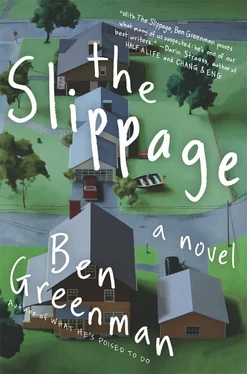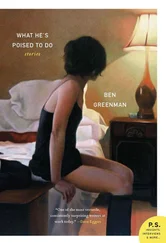“I’m fixing some things around the house,” he said. “One of the lanterns on the deck is cracked, and the inside wall of the garage is damaged.”
“The traditional couple,” she said. “Traditionally maintaining their traditional home in their traditional neighborhood.”
“Oh,” he said. “That reminds me. The Johnson place sold.”
“Bound to happen,” she said. “Would have been more surprising if it didn’t.” What had happened? They had been taking it to Tom, and then William had started in after Louisa, and then the ground had reversed and she was bearing down on him. William rotated his coffee cup, suddenly eager for the day to start.
William hadn’t been into the junk room in weeks, but things were just as he remembered. There was a scarred wooden desk and a ripped beanbag chair, an old computer that worked too slowly connected to a printer that William wasn’t sure worked at all, a box of dog toys they had been sent as a promotion and never unpacked, discarded exercise equipment, a musical doll that had been Louisa’s when she was a baby, a wall calendar from a previous year. A white plastic bag, fat bellied and rabbit eared, hung from the window crank. He emptied it onto the desk: there were magazines and advertising circulars and a letter from an old college roommate of William’s who had made a killing online and now spent all his time plumping for environmental causes. He was soliciting donations and had included, as a personal appeal, a photograph from just after college, when he and William had driven to a music festival in New Orleans. William looked at the William in the picture: slimmer, lower hairline, more definition along the way. There was something in the eyes, too, a productive unknowingness. William had recently turned forty-two, a number he experienced as an atrocity. No man ever felt completely happy looking at a younger version of himself.
William left the mail in the bag, though he transferred the photo to the bottom drawer of the small table next to his bed — his museum of self, the place where he kept old letters and postcards, along with some dirty magazines and a coin collection he hadn’t thought about in years. “Louisa,” he said, coming into the kitchen. “Do you know why there’s a bag of mail in the junk room?” But Louisa was gone to the grocery.
In the first years of their marriage, William and Louisa had fought often, and he had blamed inexperience, or high spirits brought on by the habits of the inexperienced: too much drinking, too little kindness. As time went on, a civility replaced the combat, and it wasn’t until much later that it occurred to him that this placidity might be the result of what was absent rather than what was present. By that point, they mostly had only each other. Louisa had one close friend, Mary, who worked at the hospital across the municipal plaza from her office and whom she saw for lunch a few times a month. Her one ex-lover of note, Jim, was now living in Seattle with his wife and two children. William and Louisa had met Jim for dinner or drinks once every five years or so, when he was in town on business, and the meetings were cordial, heavily nostalgic, maybe a little longer than they needed to be, harmless.
For William’s fortieth birthday, Louisa had taken him for dinner in a new restaurant attached to an old hotel downtown. She debuted a low-cut red dress for the occasion, and, after a few drinks, produced a room key from a matching purse. “Another round of drinks?” she said. “We’re staying here tonight.” He put a hand on the back of her thigh in the elevator and she showed him the hollow of her throat and said, “Yes, yes,” the way she should have, but her voice came at him as if from the bottom of a well. He couldn’t do anything much in the room, and she forgave him in that same distant voice. “Things can happen,” she said. “Or not happen. That’s just how it is.”
Later that night, she shot awake and stared at the hotel walls with unfamiliarity in her eyes. “I’m not sure,” she said, and just as quickly she burrowed back into her pillow, leaving him awake and alone in the inky blue air.
Her speech in the hotel was incomplete, but that didn’t change the fact that it was essentially accurate. He had always counted on his ability to see Louisa clearly, but a part of the picture had smeared. In the months that followed, he started performing small gestures: flowers (she liked marigolds), candy (chocolate, the darker the better), the remote when they watched TV at night. He was surprised to find himself succeeding. She was ardent, generous, cooked him a meal as a surprise and placed the flowers in a prominent vase in the center of the table. “You know just what to do,” she said, looking straight at him without giving the impression that she’d rather be looking away. He ate quickly, flushed with relief.
William was watching TV in the den when Louisa appeared beside him, hair piled atop her head except for one damp strand that snaked down her forehead, aqua sweats swapped for a yellow sundress. “Will you take a ride with me?” she said.
“You don’t have to ask me twice,” he said.
“Well, now I just don’t know what to say,” she said. She headed toward the front door. “Where are you going?” he said. His car, a nondescript sedan, was in the garage.
“I’m driving,” she said. “My plan.” Her car, a nondescript SUV, was in the driveway, and they climbed in.
The radio was playing a song Louisa liked, and she sang along. In the morning, she had been all nuance, impossible to untangle; now she was a bright, straight line and he had to blink against it a little.
She went along Ennis, turned on Arnold, and merged into Morton. “We’re going to the mall?” William said.
“Quiet,” Louisa said. “It’s for your own good.”
Inside the mall, the white floor was slick with light. Fake flakes of snow swirled on a giant video screen, even though it wasn’t winter. Girls in high spirits laughed brightly on the perimeter of a carpeted pit where young mothers herded toddlers.
William and Louisa passed through the department store at the south end. Louisa stopped when they reached a clamor of oversize screens. “This is an appliance store,” William said, trying to hide his disappointment.
Half a dozen salespeople were milling around in identical blue uniforms, and the closest of them, a young man with tight cornrows, stepped toward Louisa. “Can I help you?”
“We want to look at dishwashers,” she said.
“How green?” She squinted and he stepped right, toward a row of low plastic boxes. “These do much better with water usage and energy expenditure. But if plates go in really dirty, they don’t always come out really clean.”
“I don’t see the point of not getting things clean,” Louisa said.
“It has to do with how much effort you’re willing to put in at the sink.”
“Does it come in stainless steel? I don’t like the black or white.”
The salesman pivoted to his left obligingly. “These are also good,” he said. “It’s turnover time so they’re on sale.”
“Green?”
“Not so much. To be honest, I hear there’s not a huge difference between one kind and the other.” His face suddenly fell, as if the beliefs upon which he was building his world had been disproven. “Here’s my card,” the salesman said. When Louisa moved to take it, he let it go quickly, as if it was hot.
“This way,” Louisa said to William, gesturing broadly as if she were guiding him down a runway. They ended up two doors down, at an almost identical store where the salespeople wore red instead of blue. The man who approached them was older, with owlish glasses. “You came to the right place,” he said, examining Louisa from head to toe in a manner that William did not find entirely reputable. He championed the stainless steel, and Louisa filed his card alongside the other one. “Well,” she said. “I guess that’s that.” She turned to leave.
Читать дальше












